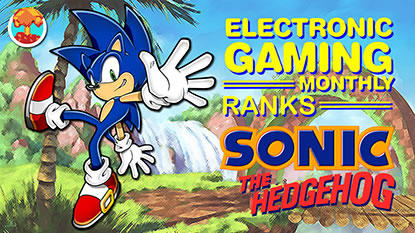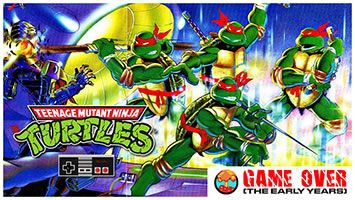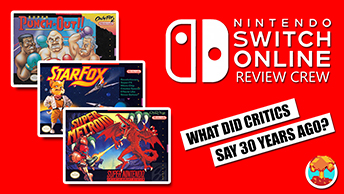- CLASSIC MAGAZINES
- REVIEW CREW
A show recapping what critics thought back
when classic games first came out! - NEXT GENERATION'S BEST & WORST
From the worst 1-star reviews to the best
5-stars can offer, this is Next Generation! - NINTENDO POWER (ARCHIVE)
Experience a variety of shows looking at the
often baffling history of Nintendo Power! - MAGAZINE RETROSPECTIVE
We're looking at the absolutely true history of
some of the most iconic game magazines ever! - SUPER PLAY'S TOP 600
The longest and most ambitious Super NES
countdown on the internet! - THEY SAID WHAT?
Debunking predictions and gossip found
in classic video game magazines! - NEXT GENERATION UNCOVERED
Cyril is back in this spin-off series, featuring the
cover critic review the art of Next Generation! - HARDCORE GAMER MAGAZING (PDF ISSUES)
Download all 36 issues of Hardcore Gamer
Magazine and relive the fun in PDF form!
- REVIEW CREW
- ELECTRONIC GAMING MONTHLY
- ELECTRONIC GAMING MONTHLY RANKS
From Mario to Sonic to Street Fighter, EGM
ranks classic game franchises and consoles! - ELECTRONIC GAMING MONTHLY BEST & WORST
Counting down EGM’s best and worst reviews
going year by year, from 1989 – 2009! - ELECTRONIC GAMING BEST & WORST AWARDS
11-part video series chronicling the ups and
downs of EGM’s Best & Worst Awards!
- ELECTRONIC GAMING MONTHLY RANKS
- GAME HISTORY
- GAME OVER: STORY BREAKDOWNS
Long-running series breaking down game
stories and analyzing their endings! - A BRIEF HISTORY OF GAMING w/ [NAME HERE]
Real history presented in a fun and pithy
format from a variety of game historians! - THE BLACK SHEEP
A series looking back at the black sheep
entries in popular game franchises! - INSTANT EXPERT
Everything you could possibly want to know
about a wide variety of gaming topics! - FREEZE FRAME
When something familiar happens in the games
industry, we're there to take a picture! - I'VE GOT YOUR NUMBER
Learn real video game history through a series
of number-themed episodes, starting at zero! - GREAT MOMENTS IN BAD ACTING
A joyous celebration of some of gaming's
absolute worst voice acting!
- GAME OVER: STORY BREAKDOWNS
- POPULAR SHOWS
- DG NEWS w/ LORNE RISELEY
Newsman Lorne Riseley hosts a regular
series looking at the hottest gaming news! - REVIEW REWIND
Cyril replays a game he reviewed 10+ years
ago to see if he got it right or wrong! - ON-RUNNING FEUDS
Defunct Games' longest-running show, with
editorials, observations and other fun oddities! - DEFUNCT GAMES QUIZ (ARCHIVE)
From online quizzes to game shows, we're
putting your video game knowledge to the test!- QUIZ: ONLINE PASS
Take a weekly quiz to see how well you know
the news and current gaming events! - QUIZ: KNOW THE GAME
One-on-one quiz show where contestants
find out if they actually know classic games! - QUIZ: THE LEADERBOARD
Can you guess the game based on the classic
review? Find out with The Leaderboard!
- QUIZ: ONLINE PASS
- DEFUNCT GAMES VS.
Cyril and the Defunct Games staff isn't afraid
to choose their favorite games and more! - CYRIL READS WORLDS OF POWER
Defunct Games recreates classic game
novelizations through the audio book format!
- DG NEWS w/ LORNE RISELEY
- COMEDY
- GAME EXPECTANCY
How long will your favorite hero live? We crunch
the numbers in this series about dying! - VIDEO GAME ADVICE
Famous game characters answer real personal
advice questions with a humorous slant! - FAKE GAMES: GUERILLA SCRAPBOOK
A long-running series about fake games and
the people who love them (covers included)! - WORST GAME EVER
A contest that attempts to create the worst
video game ever made, complete with covers! - LEVEL 1 STORIES
Literature based on the first stages of some
of your favorite classic video games! - THE COVER CRITIC
One of Defunct Games' earliest shows, Cover
Critic digs up some of the worst box art ever! - COMMERCIAL BREAK
Take a trip through some of the best and
worst video game advertisements of all time! - COMIC BOOK MODS
You've never seen comics like this before.
A curious mix of rewritten video game comics!
- GAME EXPECTANCY
- SERIES ARCHIVE
- NINTENDO SWITCH ONLINE ARCHIVE
A regularly-updated list of every Nintendo
Switch Online release, plus links to review! - PLAYSTATION PLUS CLASSIC ARCHIVE
A comprehensive list of every PlayStation
Plus classic release, including links! - RETRO-BIT PUBLISHING ARCHIVE
A regularly-updated list of every Retro-Bit
game released! - REVIEW MARATHONS w/ ADAM WALLACE
Join critic Adam Wallace as he takes us on a
classic review marathon with different themes!- DEFUNCT GAMES GOLF CLUB
Adam Wallace takes to the links to slice his way
through 72 classic golf game reviews! - 007 IN PIXELS
Adam Wallace takes on the world's greatest spy
as he reviews 15 weeks of James Bond games! - A SALUTE TO VAMPIRES
Adam Wallace is sinking his teeth into a series
covering Castlevania, BloodRayne and more! - CAPCOM'S CURSE
Adam Wallace is celebrating 13 days of Halloween
with a line-up of Capcom's scariest games! - THE FALL OF SUPERMAN
Adam Wallace is a man of steel for playing
some of the absolute worst Superman games! - THE 31 GAMES OF HALLOWEEN
Adam Wallace spends every day of October afraid
as he reviews some of the scariest games ever! - 12 WEEKS OF STAR TREK
Adam Wallace boldly goes where no critic has
gone before in this Star Trek marathon!
- DEFUNCT GAMES GOLF CLUB
- DAYS OF CHRISTMAS (ARCHIVE)
Annual holiday series with themed-episodes
that date all the way back to 2001!- 2015: 30 Ridiculous Retro Rumors
- 2014: 29 Magazines of Christmas
- 2013: 29 Questionable Power-Ups of Christmas
- 2012: 34 Theme Songs of Christmas
- 2011: 32 Game Endings of Christmas
- 2010: 31 Bonus Levels of Christmas
- 2009: 30 Genres of Christmas
- 2008: 29 Controls of Christmas
- 2007: 34 Cliches of Christmas
- 2006: 33 Consoles of Christmas
- 2005: 32 Articles of Christmas
- 2004: 31 Websites of Christmas
- 2003: 29 Issues of Christmas
- 2002: 28 Years of Christmas
- 2001: 33 Days of Christmas
- NINTENDO SWITCH ONLINE ARCHIVE
- REVIEW ARCHIVE
- FULL ARCHIVE
The Most Evil Strategy Guide To Ever Be
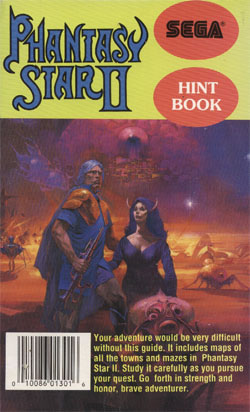
Who knew that this little strategy guide would cause so many headaches?
As funny as it sounds, there was a time almost twenty years ago when both Electronic Gaming Monthly and Mega Play were doing everything in their power to end the tyranny of Sega's pack-in hint books. They didn't care that traditional 16-bit RPGs were often 25% more expensive than a 2D platformer, nor did they worry about the cliche stories or the relative lack of innovation in the genre. Instead they spent months berating Sega for offering

That's right, the magazine responsible for putting Hudson Hawk on its cover is questioning Sega's business plan!
If you were to believe Electronic Gaming Monthly, then Sega literally "ruined" Phantasy Star II by offering a free strategy guide with every purchase. Quartermann (who is always known for his accuracy) was so upset that he literally begged Sega not to punish Genesis owners any more: "Don't, don't, I'm begging you DON'T, put Phantasy Star 3 players through the same thing!"
Month after month the editors of Electronic Gaming Monthly would rail against Sega for offering such an evil extra with their product. "Why can't [Sega] release the book a couple of months after the cart hits the
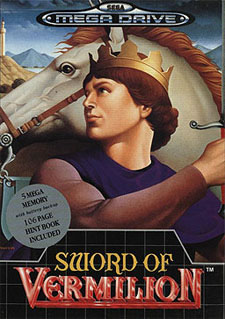
Dislike Sword of Vermilion because it's a bad game, not because it came with a strategy guide!
Endure the same punishment? All because Sega decided to offer a strategy guide as a free incentive to buy their expensive adventure game? Oh the horror! How could a company ever get away with doing something so downright dastardly? That's the kind of offense that should have been punishable by a public hanging. No trial or jury, straight to execution!
What would make a game company do something as downright evil as package in a free strategy guide? Who
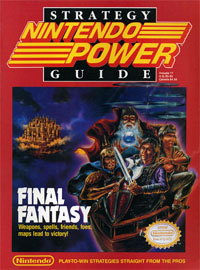
This Nintendo Power strategy guide helped turn Final Fantasy into a hit!
Companies like Sega and Square were asking twitch-happy American gamers to slow down the pace and try something turn-based instead. This was not an easy sell. Throw in a high price tag (due in large part to localization and the
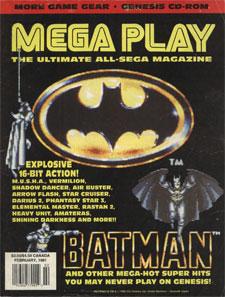
Now that you've seen this cover I don't want to hear any crap about my crummy Photoshop work!
But that reasoning wasn't good enough for the game journalists of the early 1990s. Instead of simply pointing out that veteran gamers should ignore Sega's strategy guide, they actually used the books as a reason to give lower scores. "Sorry Sega," starts Mike at Mega Play (EGM's Sega-specific sister publication). "This great RPG could have been rated higher if you wouldn't have again included that #@$% walk-through book." Another critic asked, "What's Sega going to do next, include a private tutor with [Phantasy] Star 3?" The same critic later says that Sword of Vermilion is a "nice role player that unfortunately is spoiled by the free cheat
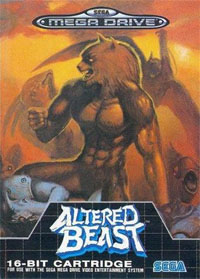
Altered Beast didn't come with a strategy guide, so I guess it must be better than Phantasy Star II!
While I pick on Mega Play, this practice of lowering the scores ran rampant across all of the Sendai Publishing magazines. Editorials were written about it, Quartermann was brought in and gamers were bombarded with reasons not to invest their money in Phantasy Star II, one of the very best 16-bit role-playing games. All because Sega tried to give gamers an incentive to buy their expensive adventure game.
I can certainly see their point. The fun of most role-playing games is the adventuring, where you're off
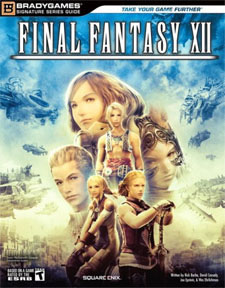
With thousands of enemies and secret items, there are plenty of reasons to pick up this strategy guide!
Ironically, these days there are a lot of honest adventure gamers who buy strategy guides and have a splendid time with the newest RPG. It's not because they want to cheat and have an easy time with things, instead these people want to get to know their enemies, know what they have to do to find the most
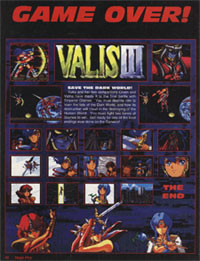
Oh no, I spoiled Valis III (not that you can read it at this size)!
The reason people play role-playing games isn't because of the battles or the dungeons, it's because these games offer deep storylines that will keep you glued to your television for dozens of hours. EGM makes it sound like the Phantasy Star II guide was jam packed with story spoilers, giving you little
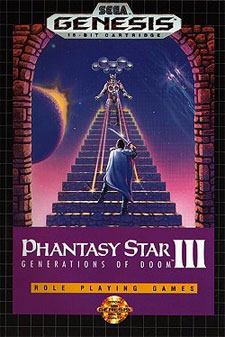
... And that's how Phantasy Star III became the greatest Phantasy Star game ever!
For a magazine so worried about spoiling the fun, it does seem odd that they would print cheat codes and offer a special Game Over section that literally ruined the ending of dozens of classic games. Mega Play has no problem ruining the ending of Valis III, but Sega offering an optional hint book is over the line? No wonder the average consumer doesn't trust critics.
You'll be happy to know that this story has a happy ending. After the release of Sword of Vermilion, Sega decided to stop publishing these pack-in strategy guides. Gamers stuck in Phantasy Star III had to call the special 1-900 number, fork over $14.95 for a hint book, or track down a friend who was also playing the RPG classic. And boy was Mega Play happy. Each one of the editor's made mention and gave the game high marks, effectively making Phantasy Star III Sendai's best reviewed game in the series.

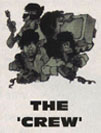
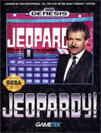


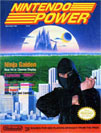
HOME |
CONTACT |
NOW HIRING |
WHAT IS DEFUNCT GAMES? |
NINTENDO SWITCH ONLINE |
RETRO-BIT PUBLISHING
Retro-Bit |
Switch Planet |
The Halcyon Show |
Same Name, Different Game |
Dragnix |
Press the Buttons
Game Zone Online | Hardcore Gamer | The Dreamcast Junkyard | Video Game Blogger
Dr Strife | Games For Lunch | Mondo Cool Cast | Boxed Pixels | Sega CD Universe | Gaming Trend
Game Zone Online | Hardcore Gamer | The Dreamcast Junkyard | Video Game Blogger
Dr Strife | Games For Lunch | Mondo Cool Cast | Boxed Pixels | Sega CD Universe | Gaming Trend
Copyright © 2001-2024 Defunct Games
All rights reserved. All trademarks are properties of their respective owners.
All rights reserved. All trademarks are properties of their respective owners.













